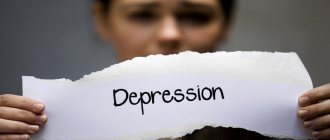The main symptoms of depression are manifested by the so-called depressive triad:
Hypotymia is a persistent, more than two weeks, decrease in mood, which is expressed by melancholy, depression, sadness, apathy;
Ideational inhibition – decreased attention, ability to perceive and comprehend what is happening, slowed speech and lack of spontaneous speech;
Motor retardation – stiffness, lethargy to the point of stupor, reluctance to move, worsening reactions.
In addition to these obligatory signs of depressive conditions, there is high variability in other symptoms. Moreover, for different types of depression, the predominance of certain manifestations is typical.
Suppression of urges:
- anorexia – loss of taste for food, loss of appetite;
- decreased or loss of libido (frigidity), loss of the ability to achieve sexual satisfaction;
- suppression of the instinct of self-preservation;
- loss of interest in life and communication.
Other mental symptoms:
- decreased self-esteem, pessimism in assessing one’s own past, present, future;
- self-accusation, self-abasement, thoughts about one’s worthlessness and insignificance;
- avoidance of contacts and suffering from loneliness;
- sleep disturbance – insomnia or increased sleep duration, lack of feeling of sleep.
Somatic disorders:
- weight loss;
- dry and dull skin, peeling, brittle hair and nails;
- increased blood pressure, tachycardia;
- menstrual irregularities;
- dyspeptic disorders.
Depression does not occur spontaneously, but develops gradually. Moreover, the first signs of the disease are sufficiently erased. Therefore, in the best case, patients turn to doctors only after the entire depressive triad has clearly formed.
What is depressive disorder
This is a mental disorder, accompanied by symptoms such as worsening mood, apathy, lack of interest in familiar things, pessimistic thinking, retardation of movements, and inability to feel positive emotions.
The patient's self-esteem decreases, sometimes accompanied by alcoholism and drug addiction (this is explained by the desire to drown out bad thoughts). Numerous articles have been written about depression, claiming that it can last for months or years. People often perceive their psychological state not as an illness, but as laziness and pessimism. Therefore, many of them do not seek professional medical help, feeling this way for months and years. According to statistics, every tenth inhabitant of the earth who has reached 40 years of age suffers from this disease (2/3 of them are women). After 65 years, the disease occurs three times more often. Among minors, only 5% experience this mental illness. It is important to contact a specialist in time so that he can diagnose it and begin psychotherapy. It is treatable in the vast majority of cases. Today's methods provide a high probability of success due to their effectiveness.
It is impossible to think that this disease arose only recently. It was described in antiquity, including by Hippocrates himself, who described melancholy, which has symptoms extremely similar to depression.
Its causes are varied: from significant emotional upheavals (death of a relative, loss of housing, dismissal) to completely insignificant ones. Sometimes a disorder can occur for no apparent reason.
A common factor is social. A person cannot withstand the high pace of life, failures at work, constant stress, and is worried about the difficult economic situation. This is how the endogenous type of depression manifests itself.
The root of the disease is also a lack of dopamine, norepinephrine, and serotonin, which occurs due to lack of sunlight. This is a seasonal form of the disease. One of the causes of mental illness is side effects from medications taken. The emotional state returns to normal after stopping the medication. Depression is caused by various diseases (Alzheimer's, concussion, schizophrenia, etc.).
Main symptoms:
- depressed state lasting at least 2 weeks;
- constant fatigue throughout the month;
- anhedonia (things you did before no longer bring positive emotions, surrounding events do not interest you);
- negative thinking, pessimism, suicidal thoughts;
- feelings of insignificance, fear, guilt;
- the person is incapable of concentrating and avoids making decisions;
- low self-esteem;
- increased or decreased appetite;
- insomnia;
- difficulties in communicating with others, conflicts with family and friends;
- Mental illness in children is characterized by nightmares at night, academic failure, alienation, and aggression.
A specialist will diagnose the disorder if symptoms persist for more than two weeks.
Treatment of depression. How to cope with the disease?
Depression (depressive syndrome) is one of the most typical psychopathological syndromes and can occur in almost all mental illnesses. The main type is the so-called endogenous depression - recurrent depressive disorder, the depressive phase of bipolar affective disorder (BD), a single attack of endogenous depression usually in old age, depression in the structure of schizophrenia. In the classification, depression is divided by severity - mild, moderate and severe.
Symptoms of depression that need to be treated
The typical clinical picture of depression, which requires drug treatment, is characterized by a depressive triad, which is manifested by decreased mood, slow thinking and motor inhibition, as well as somatic symptoms of sympathicotonia (in particular, tachycardia, constipation, weight loss, increased blood pressure, mydriasis - dilatation pupils, dry skin and mucous membranes). The above symptoms may be accompanied by anxiety, melancholy, hopelessness, sleep disturbance and cognitive function, decreased appetite and libido.
General principles of treatment for depression
Treatment of depression combines two aspects - pharmacological and psychotherapeutic, that is, drug therapy is used, as well as psychotherapy. The possibility of psychotherapy depends on the severity of depression and, accordingly, the patient’s ability to cognitively function. Because in depressed patients, the ability to concentrate attention and perceive information suffers, and therefore, with a certain degree of severity of depressive symptoms, patients are simply not able to work with a psychotherapist or psychologist, as well as perform psychotherapeutic techniques. Here, of course, you need to adhere to the basic principle: first, treat the patient with medication, relieve anxiety, normalize sleep, reduce the intensity of depressive symptoms, and then cognitive functions will significantly improve, which will make it possible to subsequently include psychotherapy for rehabilitation.
In the context of psychotherapeutic treatment, it is also necessary to address such an issue as the type of depression. It can be endogenous (a depressive episode in the structure of bipolar affective disorder (BD), recurrent depressive disorder, depression in schizophrenia, etc.) or psychogenic, when the occurrence of a depressive state is based on a psychological factor or a traumatic situation. That is, depending on the severity of depression (psychotic or non-psychotic), the emphasis in treatment is on one of the aspects (pharmacological or psychotherapeutic). As a rule, mild depressive states, especially those where the cause of occurrence was a traumatic event, can respond well to psychotherapeutic correction without the use of antidepressants; anti-anxiety drugs are sufficient here. Severe depressive episodes should be treated with medication using antidepressants. Let's consider the basic principles of helping patients with depression.
Treatment of depression with antidepressants
Despite the fact that depressive conditions can sometimes be reversed without treatment, the use of drug therapy with antidepressants accelerates the recovery process, improves the course of the pathology and prevents relapses.
Also, a very important reason for prescribing psychopharmacological treatment is the high likelihood of suicide in patients with depression.
Timing of taking antidepressants in the treatment of depression
Treatment begins with small doses of antidepressants, which are gradually titrated (adjusted) until the proper therapeutic effect is achieved. Any changes in drug dosage should be under the strict supervision of a physician to prevent side effects. Underestimating the doses of antidepressants used contributes to the chronification of a depressive state, the formation of therapeutic resistance (when the level of response to an antidepressant decreases), an increase in the time required to achieve remission, as well as a decrease in the quality of life of patients and the risk of suicidal thoughts and intentions.
Features of the use of antidepressants
It is necessary to understand that antidepressants begin to act only after 3 weeks from the start of treatment, which, in combination with a significant deterioration in the quality of life, is especially painful for the patient. All this time, anxiety, internal tension, sleep disturbances and other manifestations of depression may persist. Therefore, from the very beginning of treatment until the start of action of antidepressants (for a month or more), it is necessary to take sedative therapy - tranquilizers and/or anti-anxiety drugs (anxiolytics), and also, possibly, sleeping pills. They will reduce the intensity of anxiety, improve sleep, but will not affect low mood, lack of joy, as well as the desire and ability to perform usual work (partly due to cognitive failure). Therefore, patients do not feel an improvement in their condition for 1-2-3 weeks after starting treatment with antidepressants, they stop taking them, citing the fact that “it doesn’t help me.” How can an antidepressant help before it starts working?
But when antidepressants begin to work, the intensity of depression will decrease. And along with anxiety, the activity of the sympathetic part of the autonomic nervous system will decrease, which will lead to the elimination of heartbeat, a decrease in high blood pressure, restoration of the motor function of the stomach and intestines, an increase in the speed of motor reactions, muscle tone and other somatic symptoms that often mask the typical clinical picture of depression .
Treatments for Depression
Rules have been developed according to which, after a certain period of ineffectiveness of an antidepressant, it should be replaced by another, usually with a different mechanism of action. That is, if unsuccessful therapy was carried out with an antidepressant that affected only one neurotransmitter - serotonin, then it must be replaced with another antidepressant of polyvalent action, which will affect two neurotransmitter systems involved in the formation of depression - serotonergic and noradrenergic. If there is repeated ineffectiveness, a change to an antidepressant with a different mechanism of action may be necessary. There are also evidence-based recommendations for the combined use of two antidepressants, which can complement and enhance the effects of each other. But in this case, it is necessary to use antidepressants of various types, taking into account their compatibility in terms of various mechanisms of inhibition or stimulation of neurotransmitters (serotonin and norepinephrine). If a subsequent decrease in intensity and elimination of depressive symptoms is not observed, you need to think about adding additional drugs, for example, from the group of mood stabilizers.
Combination treatment for depression
When treating a depressive state, combination therapy can also be prescribed in the form of a combination of two antidepressants + a tranquilizer or anxiolytic (anti-anxiety drug) or an antidepressant + antipsychotic. The last option will be most appropriate if we are dealing with mental illnesses such as schizoaffective disorder with a depressive component, depressive-paranoid symptoms in schizophrenia, post-schizophrenic depression or recurrent depressive disorder with psychotic inclusions (delusional ideas of self-deprecation, guilt, sinfulness, etc. .).
Although it should be noted here that when treating depression, which is observed in schizophrenia and schizoaffective disorder, as well as post-schizophrenic depression, one must take into account the fact that antidepressants are propsychotics. And if in this case there is no “cover” with antipsychotic drugs when taking antidepressants, then an exacerbation of delusional or hallucinatory symptoms may be observed.
It should be noted that in the vast majority of cases, depression in schizophrenia is secondary, that is, the patient’s reaction to extremely frightening delusional-hallucinatory experiences. How can one be in a good mood if the patient has delusions of persecution and influence, and he is sure that he is in extreme danger, and he is being pursued by a gang that wants to deal with him and his family? What if unknown enemies act on him with electromagnetic waves and cause irreparable harm to his health? Therefore, in these situations, the patient’s mood, of course, will not be good. In such cases, it is not recommended to prescribe antidepressants, since this leads to a protracted course and therapeutic resistance (immunity to antipsychotic drugs) of schizophrenic symptoms. And even rare cases of primary (endogenous) depression in the structure of a schizophrenic attack are not an absolute indication for the addition of an antidepressant, as evidenced by the results of a meta-analysis (summarization) of literature sources.
When treating a depressive state in schizoaffective or bipolar affective disorder, one must not forget about the possibility of phase inversion into manic, which can be observed even with the mandatory use of mood stabilizers. Therefore, correct dosing of thymostabilizers should be carried out with the obligatory determination of the exact dose of daily intake, based on laboratory data when determining the amount of the drug in the blood serum, when the indicator should be in the therapeutic window.
If we talk about post-schizophrenic depression, then it must be said that the rapid achievement of complete remissions in schizophrenia, when there is a complete absence of hallucinatory-paranoid symptoms, is associated with the frequency of its occurrence and the severity of depressive symptoms.
How long does it take to treat depression?
The treatment process for depression can be divided into two stages. The first phase of treatment for depression is active therapy, when medication is aimed at eliminating depressive symptoms. An equally important stage in the treatment of depression is anti-relapse (preventive) therapy, which lasts much longer.
Active therapy for depression
Treatment with therapeutic doses of antidepressants lasts 6-7 months, although relief of depression symptoms usually occurs much earlier - within 1-2 months. But therapeutically resistant and prolonged (over 1 year) depression is often observed. In these cases, active therapy is carried out longer and is accompanied by a change or combination of antidepressants. During the active phase of therapy, symptoms of depression such as motor retardation, agitation - severe anxiety, suicidal thoughts, persistent low mood, possible delusional ideas of self-deprecation and self-blame, as well as the somatic symptom complex that accompanies depression - are relieved.
In this case, it is important not to underestimate the dose of drugs, taking into account the recommendations, and a combination of two antidepressants is also possible, taking into account their action profile. Treatment with antidepressants can, if necessary, be supplemented by the prescription of mood stabilizers or antipsychotics, as mentioned at the beginning of the article. There are also other methods to overcome resistance in the treatment of depression.
Preventive therapy for depression
Taking preventive therapy prevents the recurrence (recurrence) of the disease, i.e. helps to avoid relapse of the disease, the likelihood of which immediately after the main period of treatment is very high. Prophylactic medication should be continued over a long period of time. It is believed that anti-relapse therapy can be canceled without risk only with the appearance of the first clear signs of cerebral atherosclerosis. It is worth considering that preventive therapy with mood stabilizers ensures the prevention of relapses only after 1.5 years of continuous use. During this period, relapses of depression are possible, which are less pronounced and shorter lasting. It is very important to understand that such relapses are not an indicator of the ineffectiveness of anti-relapse drugs (thymostabilizers) and a reason for their discontinuation. Relapses of depression can be treated with antidepressants while continuing to take mood stabilizers. This reduces the likelihood of a recurrent attack of the disease.
Treatment methods for depression. Psychotherapy for depression
As already reported at the beginning of this article, psychotherapy is possible for mild degrees of depression. This is due to the fact that in a depressed state, concentration and perception processes deteriorate, and in cases of moderate and severe depression, it simply becomes impossible to conduct psychotherapy. In these cases, only after the use of drug therapy with antidepressants and improvement of the condition, as well as cognitive functions, it becomes possible to use psychotherapeutic techniques.
According to recent research, drug therapy for depression works most effectively in combination with cognitive behavioral (CBT) and interpersonal psychotherapy. The combination of these two approaches increases the possibility of achieving success in the treatment of depression.
The following psychotherapeutic methods and directions are the most recommended for depressed patients.
Individual psychotherapy for depression
During the session, the specialist studies the patient’s irrational cognitive attitudes, which cause distorted emotional reactions, and these, in turn, can cause maladaptation and the occurrence of depressive states in psychogenic depression. The patient learns to cope with these attitudes and replace them with other adaptation mechanisms. For example, a psychotherapist works on the patient’s established stereotypes of thinking: “Nothing will work out for me,” “I’m worthless,” “None of this makes sense.” Naturally, for sufficient compliance it is necessary to preliminarily carry out psychopharmacological treatment, especially in cases of severe depression. Often, ideas of self-deprecation, self-blame, low self-esteem, as well as lack of faith in oneself and the future, disappear as the patient recovers from depression during the treatment process. And then psychotherapy is often not necessary.
Group interpersonal psychotherapy in the treatment of depressive disorder
During the session, the patient learns to communicate with others, create harmonious social connections, and feel safe during communication. Group classes are important, they help a person understand that his problem is not unique, and there are other people with similar diseases. Sometimes the positive example of various patients allows you to be inspired and find the strength to get out of a depressive state, which has a positive effect on treatment.
Family psychotherapy with the participation of loved ones of a depressed patient
Unfortunately, relatives in many families act as a stress factor. To maintain comfortable relationships in the family, it is necessary to work with the patient’s loved ones. This makes it possible to reduce pressure on a person and create a favorable climate, which plays an important role in the treatment of depression.
Treatment of depression. Inpatient or outpatient treatment?
As a rule, mild and moderate depressive conditions can be treated on an outpatient basis. Severe depression with a psychotic component, suicidal thoughts and intentions require treatment in a hospital - this ensures the patient’s safety.
Prognosis for the treatment of depression
Modern antidepressants, the availability of approved protocols for the treatment of depressive disorder, the possibility of changing and combining drugs to achieve a better therapeutic effect, make it possible to predict with a high probability a significant improvement in mental health in depression.
Obstacles to achieving results may include underestimating doses of required medications, patient ignorance about the duration of therapy, and prejudices associated with long-term medication use.
Also, the human factor, the attitude of the patient himself, as well as a trusting relationship with the doctor play a significant role in the effectiveness of treatment for depression. If there is a desire to get well, to get away from the disease, then the likelihood of success increases significantly.
How is depression treated?
According to WHO, about 80% of all those who seek help get rid of symptoms of chronic depression and restore mental health as a result of psychiatric treatment. Everyone has the right to maintain their mental health as normal as their physical health. Modern medicine can provide quality therapy when it occurs. To start it, you need to contact a doctor who treats depressed patients. You can’t go to the pharmacy and buy the first drug you like, or the one recommended by a friend or colleague. Taking the wrong pills will only worsen the patient's condition. It is also not recommended to try to diagnose the disease yourself by reading articles on the Internet - help should be professional. It consists of finding an approach to everyone and taking comprehensive measures (medicinal and non-medicinal).
The main methods used to get rid of symptoms:
- Medicines. The doctor prescribes anxiolytics, antidepressants, inhibitors, or mood stabilizers (for example, lithium) to the patient. Choosing the wrong medication can lead to the possibility of complications.
- Psychotherapy. May include behavioral therapy, psychoanalysis, and other psychotherapeutic areas. Conducted individually, in a group or with the family.
- Phototherapy. This method is often used in winter, since in winter the patient’s emotional state worsens due to the lack of natural sunlight. During the procedure, the patient is placed under bright light, which should compensate for the lack of sun.
- Electroconvulsive therapy. Electric current is used in extreme cases, if the patient is so depressed that he is unable to take medications on his own. Under the influence of current, amino acids are produced in the brain that promote the synthesis of mediators. It is the mediators who are responsible for our positive and negative attitudes.
When carrying out procedures for depression in a hospital, it is important that the specialist treats the patient kindly and reaches full understanding with him. The doctor chooses the types of therapy based on the symptoms:
- anxiety, its degree, how it manifests itself;
- frequent, rapid mood changes;
- presence of panic disorders.
When the disorder occurs, the patient is characterized by a sad, apathetic, hopeless state, a feeling of depression, and a lack of enthusiasm in household chores, at work, or even when engaging in hobbies. Everything ceases to make sense, to cause joy. There is a persistent feeling of guilt, vulnerability, weight loss against the background of a decrease in cravings for food. A common symptom is insomnia. A person does not get enough sleep and gets up tired in the morning.
Cognitive-behavioral psychotherapy is needed to relieve the following symptoms:
- social isolation;
- no purposeful activity or plans;
- passivity;
- lack of interest in pleasure and, as a result, life resembles a routine existence.
The goal of such therapy is to change the patient’s thinking and, as a result, his daily actions, which cause despondency and constant worry. Behavioral psychotherapists believe that depression is a behavior to which a person becomes accustomed, and the therapist must wean him from it.
Content:
- Who suffers
- Why does it occur
- Signs
- Consequences
- How to go out on your own
With prolonged drinking, depression becomes a natural result of mental and physical exhaustion against the background of prolonged use of large doses of alcohol. According to statistics, almost half of alcoholics have experienced this disorder at least once. As a rule, the symptoms are mild or moderate, but a severe course is not excluded.
Where to go for help
A pessimistic attitude does not mean chronic depression. Mood may decrease due to natural life problems related to family, work, friends, personal life and other failures. After unpleasant events, healthy people gradually return to normal. Apathy and despondency pass. If they remain for a long time, you need to sound the alarm. The most severe types of the disease are characterized by the following symptoms:
- The patient is unable to satisfy his basic needs: prepare food, wash, brush his teeth.
- He lies in bed for a long time.
- Refusal to eat, lack of appetite.
- Dejection, thoughts of suicide.
If one of these symptoms occurs, you should think about the need for hospital treatment, since the sick person poses a danger primarily to himself. In the hospital, the patient will be prescribed the necessary medications, will undergo psychotherapy and, most importantly, the doctor will constantly monitor him. The clinic provides all conditions for the amendment.
A not so significant disadvantage of being there is boredom and the feeling that time is passing too slowly. But, in advanced forms of the disorder, this is the only effective way to overcome the disease, since the patient in this case needs the continuous supervision of the treating doctor.
Signs
The pathology is manifested by apathy, increased fatigue, deterioration of sleep (insomnia, frequent awakenings, nightmares), and decreased appetite. Passivity, lack of initiative, and inability to have fun predominate. A person tries to isolate himself from loved ones and the social environment, suffers from feelings of guilt, melancholy, anxiety, and bad mood. The need to hide one's feelings results in atypical behavior.
Mental and physical inhibition is noted. Performance is impaired; in moderate and severe cases, a person loses the ability to perform professional duties. Refusal of alcohol causes the addition of bodily symptoms: swelling, changes in blood pressure, sweating, pain of various localizations. In severe cases, psychotic manifestations are observed.
How is treatment done in a hospital?
Before the course, the subject is required to do the following tests:
- blood analysis;
- diagnosis of the thyroid gland;
- analysis of the urinary system.
For the first two weeks, it is better for him not to leave the medical center, going outside, as he must be under constant supervision. After this period, the patient, on the contrary, is recommended to move more and breathe fresh air.
pros
:
The patient is under continuous observation. It is especially indispensable for those suffering from severe depression, which is characterized by suicidal thoughts. The medical staff feeds the patient and escorts him to the toilet.
A complex approach. Significant doses of antidepressants, antipsychotic drugs (for sleep disorders). If refused, they are forcibly administered intravenously. The course also includes vitamins, nootropics and essential amino acids.
Minuses
:
Not suitable for anxious and suspicious patients. The ward neighbors will negatively influence such patients, causing fear, lack of sleep, headaches, neutralizing the entire effect of therapy and making it completely useless.
Elderly people over 65 years old are characterized by heart disease, brain disease, diabetes, and other age-related pathologies. There are no doctors in the hospital who can solve the problem of these pathologies or provide emergency care.
Treatment of depression in Moscow takes place in modern medical institutions. The staff of the treatment center will do everything possible to pull a person out of chronic depression. We treat using modern equipment, and our staff consists of professionals.
Worsening of the condition
Without appropriate treatment, depression becomes even more severe. Melancholy becomes unbearable and is often combined with anxiety and lack of feelings. Deterioration in memory, perception, and ability to think clearly becomes obvious. The person realizes the loss of his abilities and sharply regrets them. There may be an exaggeration of once-committed offenses.
The appearance changes - the condition of the skin worsens, its turgor decreases, it becomes pale, sometimes even blue, and flakes off. Nails break, hair becomes dull. Patients stop taking care of themselves. Women often experience disruptions to their monthly cycle, leading to the onset of amenorrhea. Somatic symptoms include tinnitus, pain, heaviness in the head, and a feeling of coldness in the extremities.
How long is depression treated in a hospital?
Relapses of depressive disorder are not uncommon. If one has already happened, then the likelihood of the next one increases. If a patient has suffered the disease once, the probability of recurrence is 50%, after recurrence - 70%, then 90%, and so on. It is extremely important to make efforts to ensure that the first does not happen. It can be prevented by seeking help when the disease occurs.
Patients with pronounced symptoms should take medications for a long period as prescribed by a specialist. The treatment process may vary depending on the patient's condition. At the slightest improvement and relief from some symptoms, he should not quit the course (he may be convinced that this is enough). The doctor must convince the patient that it is worth going through to the end. With a relapse, it lasts longer (in proportion to the number of relapses the patient experiences).
Some older people suffer from long-term forms of depressive disorder that require long-term treatment and continuous monitoring.
Depression: causes
The causes of depression can be divided into two groups: physiological – a consequence of a disorder in the production of neurotransmitters (serotonin and norepinephrine) and psychological – a consequence of psychological trauma and experiences.
Psychological causes of depression:
- Psychotraumatic situations - violence, disasters, death of loved ones. As practice shows, this type of depression lasts from one to two months and is interpreted as an adaptation reaction, but often without professional help it can cause prolonged depression.
- Regularly experiencing stressful situations - an accumulating “lump” of troubles can cause depression. This is a constant misunderstanding of loved ones, poverty, alcohol abuse, chronic diseases. The goal of treatment in this case is not only to get rid of pathological symptoms and normalize the condition, but also to “work through” with a psychologist the cause of the depressive state (a change in attitude towards the situation - the cause, if it cannot be eliminated).
- Old psychological trauma - usually all the stressful situations that we experience in childhood are blocked by our nervous system, but they can emerge in adulthood. As a result, phobias, increased anxiety, panic attacks, obsessive thoughts, depressive states, etc. may occur. Work with the patient is also aimed at identifying and overcoming the psychological trauma experienced previously.
- Frustration is the reason for an impossible desire - when you really want it, but it is impossible to get it. Psychotherapy is aimed at utilization of needs or achievement.
- An existential crisis is a complete loss of harmony, life goals, and lack of meaning in life. It is often observed at the age of 40-50, when a person takes stock of his life. The patient needs long-term psychological therapy.
- A pessimistic outlook on life - in any action, in any situation, a person looks only for the bad, setting himself up for negative consequences. The condition can be corrected with the help of a psychologist, psychotherapist and... the desire of the person himself.
Physiological causes of depression:
Impaired functioning of the neurotransmitter systems (serotonergic and noradrenergic) - in this case, depression manifests itself for no specific reason.
- Overwork, chronic fatigue.
- Intoxication with medications, narcotic substances or excessive alcohol consumption.
- Brain injuries.
- Previous strokes.
- Diseases associated with hormonal imbalance (hypothyroidism, menopause, etc.).
- Presence of chronic diseases.
- Impaired functioning of the neurotransmitter systems (serotonergic and noradrenergic) - in this case, depression manifests itself for no specific reason.
Practice shows that depression is usually caused by several factors. An experienced doctor must determine the full range of causes and prescribe comprehensive and effective therapy. The result of treatment depends on this.
Self-medication
Self-treatment at home is not the best way to get rid of depression. It is strongly recommended to consult a doctor. But he, in turn, can do little without the desire of the patient to recover from depression. The specialist must find out the roots of the disease in a confidential conversation and convince him that help is necessary. A doctor can help much faster and more effectively if the patient looks at the problem from the right angle. Close people need to persuade him to undergo treatment.
It happens that patients are disdainful of going to the clinic and simply buy antidepressants from pharmacies that were recommended to them or read on the Internet. Medicines are selected individually; taking random medications can only worsen your mental state.
What to do if the illness persists
You should not self-medicate, it can harm your health. If the selected treatment is ineffective, the disease can last for years:
- You should consult a psychiatrist. The doctor will make an accurate diagnosis, prescribe suitable antidepressants, and prescribe an individual dosage. If necessary, medications can be replaced during therapy.
- Psychotherapy will also be required. Cognitive behavioral therapy is effective. This technique helps to identify destructive attitudes and behavior patterns and replace them with positive ones.
- The support of your close circle is important. You cannot devalue the patient’s problem, deny the existence of the diagnosis, blame him or get angry because of the presence of a mental disorder. Need support. Social adaptation is of great importance: due to pathology, a person can interrupt communication with friends. To prevent bad thoughts and feelings from aggravating a person’s condition, you should protect him from possible stress, do not start conversations with him about your own problems, and do not compare circumstances.
- You should stop taking stimulants. Alcoholic drinks, drugs. They can aggravate the condition and are often incompatible with medications.
- There was a sufficient amount of vitamins in the diet. Because vitamin deficiency increases the severity of manifestations.
Prevention
The most important thing is rest and sleep. It is recommended to follow a daily routine, go to bed and wake up at the same time. Healthy sleep lasts at least 7-8 hours. An equally important point is proper nutrition, which gives the body useful vitamin complexes. Vitamins strengthen both a person’s physical health and mental health. You need to get rid of bad habits.
A positive attitude is the best way to avoid depression. You need to find out what situations cause a bad mood and change your plans to avoid these stressful situations. You cannot take on impossible tasks. It is better to spend more time with family and friends, and if necessary, ask them for help. An active lifestyle is also the key to mental health. It is worth spending time on your hobbies and interests.
Depression is an extremely common mental illness today. But you can recover from it by simply seeking help in time, without being disdainful of it. After all, if you underestimate the scale of the problem, you can only make things worse for yourself.
Consequences of prolonged depression
If depression lasts too long, quality of life deteriorates. Since this condition deteriorates performance, a person may lose his job or lose his place of study. It is possible to stop communicating with close friends, or to part with a lover due to illness.
Often the causes of mental illness are related to the functioning of the brain. If left untreated, various mental disorders may appear. Suicidal tendencies appear. Destructive behavior and the emergence of bad habits are possible: after intoxication, symptoms often temporarily weaken, which attracts the patient.









